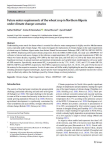Mokhtari S., Benmehaia A.M., Nourani A., Hadjeb A. (2025). Future water requirements of the wheat crop in Northern Algeria under climate change scenarios. Regional Environmental Change, 01/06/2025, vol. 25, n. 2, p. 51.
https://doi.org/10.1007/s10113-025-02378-w
https://doi.org/10.1007/s10113-025-02378-w
| Titre : | Future water requirements of the wheat crop in Northern Algeria under climate change scenarios (2025) |
| Auteurs : | S. Mokhtari ; A.M. Benmehaia ; A. Nourani ; A. Hadjeb |
| Type de document : | Article |
| Dans : | Regional Environmental Change (vol. 25, n. 2, June 2025) |
| Article en page(s) : | p. 51 |
| Langues : | Anglais |
| Langues du résumé : | Anglais |
| Catégories : |
Catégories principales 07 - ENVIRONNEMENT ; 7.3 - Eau. Gestion de l'EauThésaurus IAMM BESOIN EN EAU ; CULTURE IRRIGUEE ; CEREALICULTURE ; BLE ; CHANGEMENT CLIMATIQUE ; ALGERIE |
| Résumé : | Understanding water needs for durum wheat is essential for effective water management in highly sensitive Mediterranean zones, especially under climate change. This study investigates the implications of climate change on the water requirements of wheat crops in Northern Algeria under four distinct Shared Socioeconomic Pathways (SSP): SSP126, SSP245, SSP370, and SSP585. Employing downscaled climate projections from the CMCC-ESM2 model, the study uses CROPWAT 8.0 software to forecast and assess changes in the reference evapotranspiration (ETo) and crop water requirements (CWR) for wheat over future decades, regarding 1970-2000 as the base time span, and from 2021 to 2100 as the future time periods. Significant increases in annual maximum and minimum temperatures and variable future rainfall patterns will occur under all SSP scenarios. Specifically, mean annual ET0 is projected to rise by 7.7%, 10.6%, 12.8%, and 17.2% under SSP126, SSP245, SSP370, and SSP585, respectively. The CWR is expected to increase by 8.1%, 10.4%, 13%, and 18% by the end of the century for the respective scenarios. Levels of water stress will differ widely highlighting the need for adaptive strategies, including advanced irrigation technologies, region-specific water management practices, and expanded research into various crops to effectively address the challenges posed by climate change on wheat production. |
| Cote : | En ligne |
| URL / DOI : | https://doi.org/10.1007/s10113-025-02378-w |







